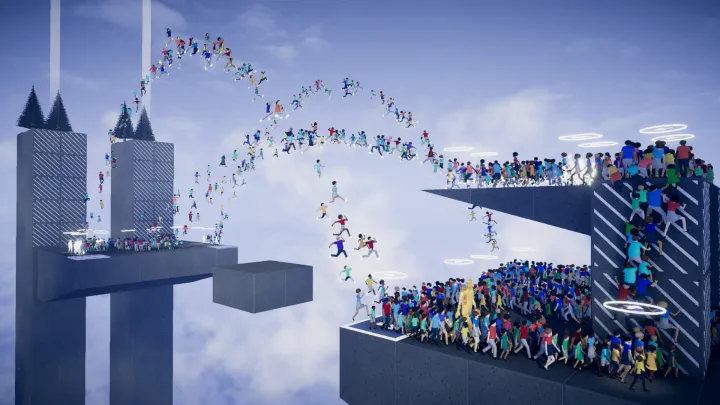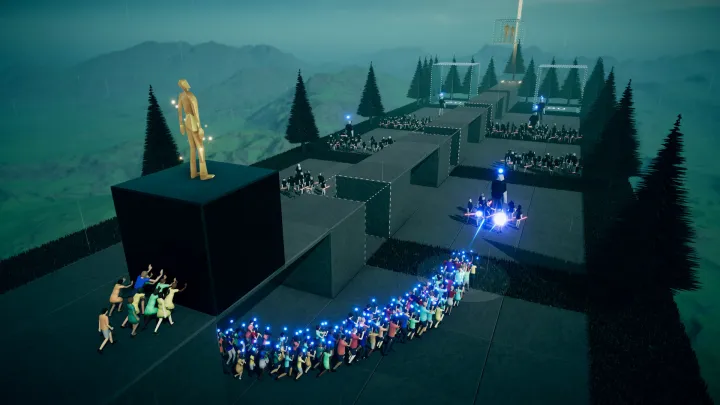Over the past few years, I’ve found myself mourning the PlayStation brand I grew up with. When I was a kid, PlayStation was an eccentric platform home to the kind of oddball creative swings you now only ever see indie publishers take a chance on. In the PS5 era, though, Sony has doubled down on a cinematic action-adventure formula that feels less safe (though likely way more profitable) by comparison. It’s an understandable pivot, but it leaves me hungry for more diverse experiences on my PS5.
Thankfully, that desire has been satiated with Humanity, a game that’s already nabbing several impressive accolades from me. It’s the best reason to subscribe to PS Plus, the best game currently available on PlayStation VR2, and perhaps the best PS5 console-exclusive period (it’s also available on PC via Steam). The unique puzzler has all the markings of those left-field PlayStation classics I love … except for the fact it wasn’t developed or published by Sony at all.
Whether you enjoy complex puzzle games or just want a good excuse to use your PSVR2, Humanity is one of 2023’s few “can’t miss” games. What starts as a straightforward game about directing rows of marching people quickly turns into an insightful, challenging, and at times dark meditation on humanity’s ability to evolve and organize.
A true PlayStation game
In Humanity, players control a shiba inu tasked with herding rows of wandering humans through puzzle chambers. Each trial is set in a small room and largely revolves around an endless stream of humans flowing out of a door. In most levels, the goal is to direct that aimless traffic by placing commands down on tiles that the humans will follow when they pass by them. These include telling them when to turn or jump, as well as granting them the power to split into different directions, float, and more. Generally, they need to be directed towards some sort of goal, though that formula gets twisted in increasingly clever ways later on.

That premise creates some striking visual imagery. It’s a bit of a marvel to see thousands of tiny humans wandering around on screen — and it’s even more impressive once they’re following the intricate pathways I lay out for them. One level had me splitting rows of humans down a Q*bert-esque grid so they could reach three different goals. Another has me sending them crisscrossing over a bridge by floating over fans, creating multiple archways of human bodies. There’s something oddly satisfying about that; It’s like watching ants march around in their incredibly disciplined fashion.
While it can be played outside of VR, the experience gets even better in a headset. My playthrough has almost exclusively been in PSVR2, where I get a bird’s eye view of each level. That lets me get a better look at each level and game plan much easier, while enhancing that ant hill perspective even more. It’s an immersive experience and by far the most compelling reason to pick up Sony’s new headset yet.

A lot of excellent puzzle games come to mind as I play through its engrossing trials. Its diorama-like levels remind me of Captain Toad: Treasure Tracker, while the visual of a stream of bodies wandering around helplessly makes it feel like a modern version of Lemmings. The closest comparison, though, is something even more obscure: Echochrome. The 2008 Sony title (which is available in PS Plus’ retro catalog) has players controlling the path of an autonomous mannequin. Humanity very much feels like a spiritual successor to that title, right down to a powerful level creator that’ll give it lots of longevity beyond its 80 main puzzles.
As I played through it, I had to double-check to make sure it hadn’t been developed internally at PlayStation Studios. It’s a tonal dead-ringer for the platform’s older exclusives, holding that same atmospheric weirdness that makes games like Fantavision or I.Q.: Intelligent Qube so endearing. Perhaps that’s why Sony has included it as a freebie for PS Plus members, one of the best moves it has made with its subscription service platform so far. It’s perfectly positioned for the current PlayStation ecosystem.
The dark side of humanity
I knew that Humanity’s challenging puzzles would get my brain moving, but I didn’t expect it to hit me as hard as it did on a thematic level too. Though it may look like a simple puzzle game about routing objects to a destination (like Freshly Frosted, but with humans instead of donuts), there’s a surprisingly rich meditation about human evolution here — and a dark one at that.

That’s because of a big gameplay change midway through its seven themed chapters. Each set of levels introduces a new tool or idea that helps the at first aimless humans better deal with obstacles. At around the midway point, it tosses in computer-controlled humans who are in competition with your little guys. That playful dynamic quickly balloons into a full-on war, as the rival faction starts attacking with laser guns and swords. That’s where things radically change.
Around chapter four, Humanity gives players a set of new commands: ones that arm humans with weapons. While the gameplay hook remains the same, levels morph into real-time tactics battles where players need to find the right way to push back against waves of ongoing enemies and wipe them out en route to safety. The cute navigation puzzles soon become dark, with tooltips explaining useful battle formations instead of helpful puzzle hints. I watch as my dumb little herd of humans turns into an organized militia, cutting down thousands of faceless people with cold efficiency.
It’s a brilliant twist that speaks to the quietly subversive nature of Humanity. It isn’t just giving players stylish routing puzzles for the sake of brain-teasing fun. Rather, it’s using that format to visualize the way that civilizations form from chaos — in both astonishing and terrifying ways. It’s a more effective commentary on war than any Call of Duty game I’ve played.

Humanity is certainly a bit of a niche title. Some of its convoluted puzzle solutions are sure to cause frustration, even though the game includes handy video solutions for each one. Though I’d still recommend it to anyone who usually doesn’t click with the genre. This is one of those special, one-of-a-kind games that puts more thought into how game mechanics can naturally communicate some ideas better than any other medium. It’s a totally oddball experience and one that I’m hoping we see Sony nurture more in its current big-budget ecosystem.
Humanity is out now on PS4, PS5, and PC. It’s compatible with VR headsets, including PlayStation VR2.



